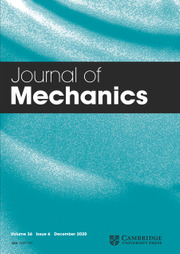Article contents
Nonlocal Dynamic Stability of DWCNTs Containing Pulsating Viscous Fluid Including Surface Stress and Thermal Effects Based on Sinusoidal Higher Order Shear Deformation Shell Theory
Published online by Cambridge University Press: 04 December 2017
Abstract
In this study, the dynamic stability of double-walled carbon nanotubes (DWCNTs) conveying pulsating viscous fluid located on visco-Pasternak medium is investigated. The effects of small scale are considered using Eringen's non-local theory. The surrounding medium of DWCNT is anticipated as a visco-Pasternak foundation including the normal, shear, and damping forces. The van der Waals (vdWs) force is considered among the inner and outer layers of DWCNT. Three types of temperature changes, i.e. uniform, linear and sinusoidal temperature rise, through the thickness are studied. The equations of motion are obtained using higher order sinusoidal shear deformation shell theory (SSDT), in which the surface effects are included. Dynamical equations of DWCNT are extracted using the energy method and Hamilton's principle. Due to orthogonal conditions, the governing equations are solved based on Bolotin method. The effects of different parameters such as surface stress, non-local parameter, fluid velocity, Knudsen's number, fluid density, dimensions ratio and various temperature loadings on the dynamic stability regions of DWCNTs are discussed.
Keywords
Information
- Type
- Research Article
- Information
- Copyright
- Copyright © The Society of Theoretical and Applied Mechanics 2018
References
- 1
- Cited by

